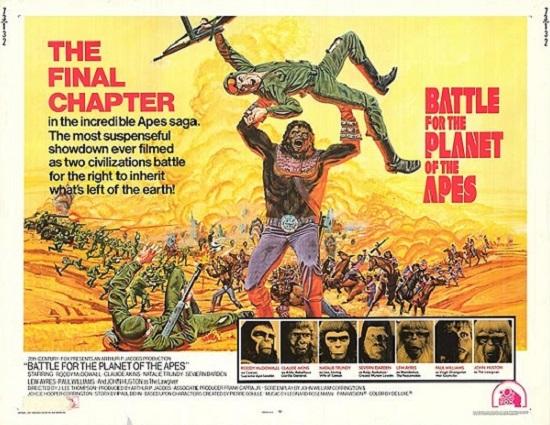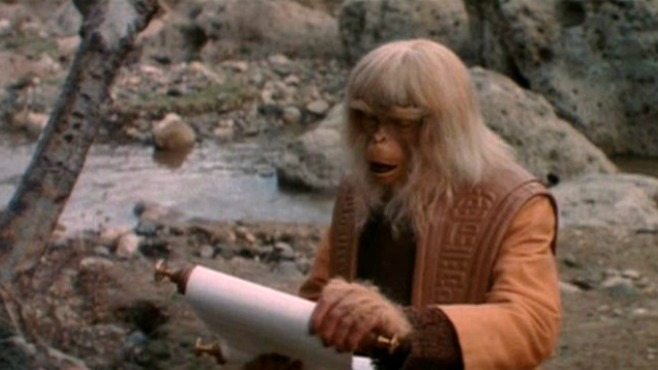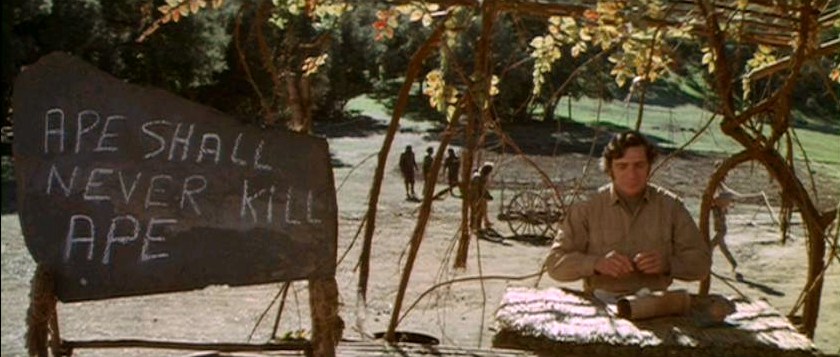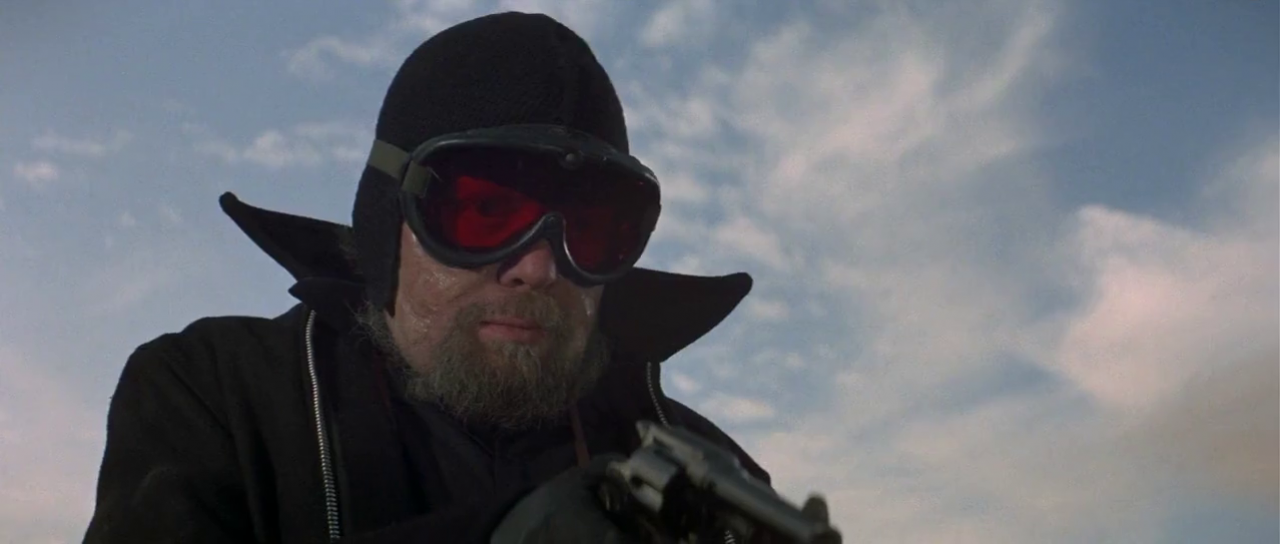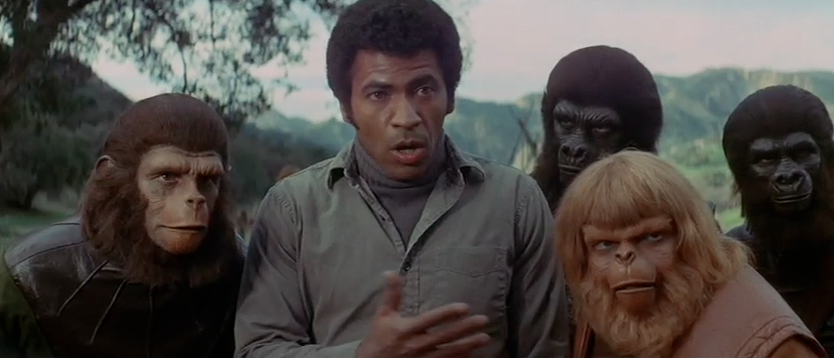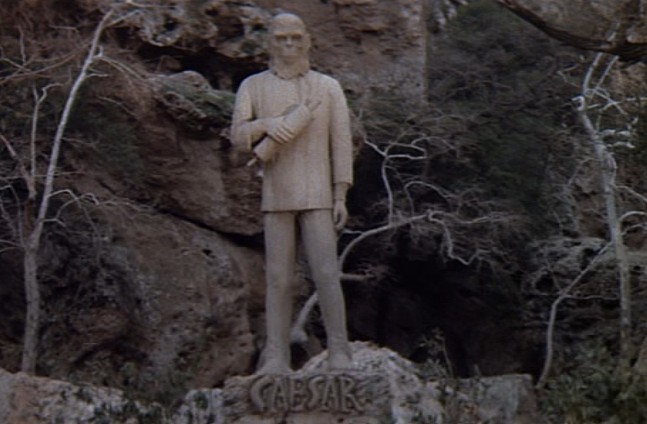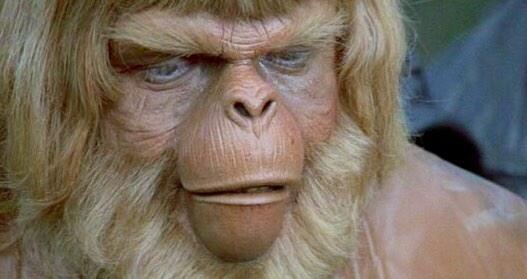The Planet of the Apes film franchise consists of, to date, eight films released between 1968 and 2014. Each week, venerable Apes mega-fan Max Robinson and inquisitive relative newcomer Dylan Roth journey to the center of the Planet of the Apes experience, one movie at a time. This is Turn Around, Bright Eyes.
Battle for the Planet of the Apes (1973)
Directed by J. Lee Thompson
SYNOPSIS: APE CITY APE APE CITY. Under Caesar’s benevolent rule, man and ape have formed a crude society after the nuclear armageddon. Will factions from within and without doom this fragile peace? WHO KNOWS ABOUT THE FUTURE, LAWGIVER? Does it matter? WHAT ARE WE EVEN DOING HERE?
Max: This movie is some Hot Bullshit.
Dylan: It’s appropriate that this film falls in the middle of our agenda, because it’s truly the Hump Day of Apes movies. An effort is made in Battle for the Planet of the Apes to bring the cycle to some sort of conclusion, wrapping up a sort of trilogy with Escape and Conquest and even folding some of poor maligned Beneath the Planet of the Apes into the mix. It’s probably the best finale the series was going to get at this point, considering they had less than $2 million with which to make it.
Max: Battle is, weirdly, the only sequel in the series TOO beholden to the characters we know? The entire movie is made up of references to the four prior films which is kind of fun when it’s “here’s what the subway mutants look like in the new timeline” and outright terrible when it’s “oh yeah, all the apes from last movie can talk 20 years later and they all wear the ape uniforms from the first two movies”. Seriously, WHY is this movie set 20 years after the last movie? The progression we see between these movies is like…unintentional magic realism.
Dylan: There’s no story reason why Battle doesn’t take place centuries after Conquest of the Planet of the Apes, with Roddy McDowall playing a descendent of Caesar struggling to maintain order, who hopes that uncovering his ancestor’s history will help him become a stronger leader. Instead, we’re dropped in a fully-formed society of talking apes who are specifically not the progeny of Zira and Cornelius, which doesn’t make sense within the framework established in the previous two films.
Max: To give you an idea how little thought went into the ape/human society of the film, apes and gorillas are taught language by a human known only as “Teacher.” Teacher tries to reach his class by showing them that SHAKESPEARE is just like RIDING HORSES but ends up getting irl cyberbullied by gorilla soldiers. When Teacher reprimands one of the gorillas, Aldo, it’s revealed that “a human can never say no to an ape” and he basically has to beg for his life. NONE OF THIS MAKES SENSE. While we’re on this, let’s talk about Aldo (Claude Akins). Aldo….Aldo is very dumb.
Dylan: Remember General Ursus back in Beneath the Planet of the Apes, the aggressive but verbose leader who led the gorilla army? Well, in this film we get his predecessor, Aldo, who is a big moron who chases his English teacher around, barely completes sentences, and then (oh yeah) murders a child who overhears his evil plans, making him the first ape to kill ape. Aldo perfectly embodies the wildly inconsistent tone of Battle of the Planet of the Apes, as he waffles between being vaguely menacing and barely funny, while being roundly stupid throughout.
Max: Aldo kinda rules as a combination of Klaus Kinski-style psychopath and Derek Zoolander-quality moron. He’s not much of a threat but uh also Caesar’s such a clueless ruler that he straight up ignores Aldo’s rowdy moron treachery because he’s so focused on finding stock footage of his parents. Caesar really earned this hit! If you’ve seen the 2010-era Apes movies, Aldo is pretty clearly the inspiration for Koba. It’s interesting to see that relationship play out in a film made decades earlier, even if it’s very poorly written. Aldo’s murder of Caesar’s son Cornelius (get it) is appropriately grim for one of these movies, even if we have zero emotional connection to either character. Aldo literally dies by falling out of a tree and nobody gives a shit.
Dylan: The preceding Apes sequels were all fairly economical on a character level, but Battle for the Planet of the Apes features a large cast of primates to not care about. Three characters return from the previous film: Caesar, his wife Lisa, and a secondary villain from Ape Management who gets promoted to Main Bad Human after the offscreen death of everyone important. We’re also treated to New MacDonald (brother of Old MacDonald), whose only value as a character is his knowledge of the last film, in which he was not actually present. A freaking kid dies and (while I was admittedly surprised) I could not have actually cared less.
Max: Main Bad Human’s name is *checks Wikipedia* Kolp and he’s basically Mutant Orson Welles (wine ad decline era). The movie leans hard on the fact that Kolp and his band of lumpy mutant humans (with a solitary hot lady?) suck, but aside from having some decent Mad Max vehicles and some ski goggles, they’re pretty forgettable foes. A better movie would use them to say something about progress or nostalgia or whatever but most of them end up shot inside a school bus. Dylan, what did you think about Caesar in this one?
Dylan: I think you hit the nail on the head earlier when you called him “clueless.” As a mostly silent victim of human oppression in Conquest, Caesar was a pretty compelling character, but in Battle, he just seems naive and aloof. Victory has defeated him, you might say—the edge that separated him from Cornelius has completely eroded away. When compared to the Shakespearean weight of Andy Serkis’s mo-capped interpretation of the character under similar circumstances in Dawn of the Planet of the Apes, McDowall’s performance feels very, very small screen. Easily his weakest turn in the series.
Max: McDowall really peaks with Conquest as far as his four-movie Apes run goes; it’s a bummer. Battle for the Planet of the Apes as a whole feels like a television episode to me. If this had been a season finale of some kind of ’70s ape tv show, it’d be okay. As a standalone film, it’s weak. Definitely still prefer it to Beneath the Planet of the Apes.
Dylan: Agreed. It’s a close race, but unlike Beneath, Battle for the Planet of the Apes doesn’t end with Charleton Heston walking backwards into hell while giving the audience the Double Dukes.
Max: It’s kind of fitting that Planet of the Apes, a franchise that slowly rolls down a hill into bullshit pseudo-philosophy, ends on a black child asking John Huston (WHO IS PLAYING APE JESUS, BY THE WAY) if ape and man will *ever* find peace before panning to a literally crying statue of Roddy McDowall. Caesar’s statue, by the way, has his own X-Men cartoon opening credits style font.
Dylan: Well, Max, it’s time for the moment of truth: Which Ape was your Favorite Ape?
Max: Oh no, you turned this around on me!!! I’m going with Virgil. As much as I loved watching Aldo pop horse wheelies and be a rude dumbass, Paul Williams as the heavenly-voiced orangutan Virgil is one of my favorite characters out of all these movies. He’s an interesting, optimistic scientific counterpoint to Maurice Evans’ Zaius of the earlier films and one of the few legitimately remarkable parts of this movie.
Dylan: I’d have to be nuts to disagree with you. Virgil is a lively and comical breath of fresh air. He’s what Neelix should have been like on Star Trek: Voyager, which really speaks to how fine a line Paul Williams had to walk between annoying sidekick and endearing supporting character. We’re going to hop over to the other side of that line next week with Paul Giamatti’s Limbo in Tim Burton’s Planet of the Apes.
NEXT WEEK: TWISTY TREES! DONE DIRT CHEAP!

